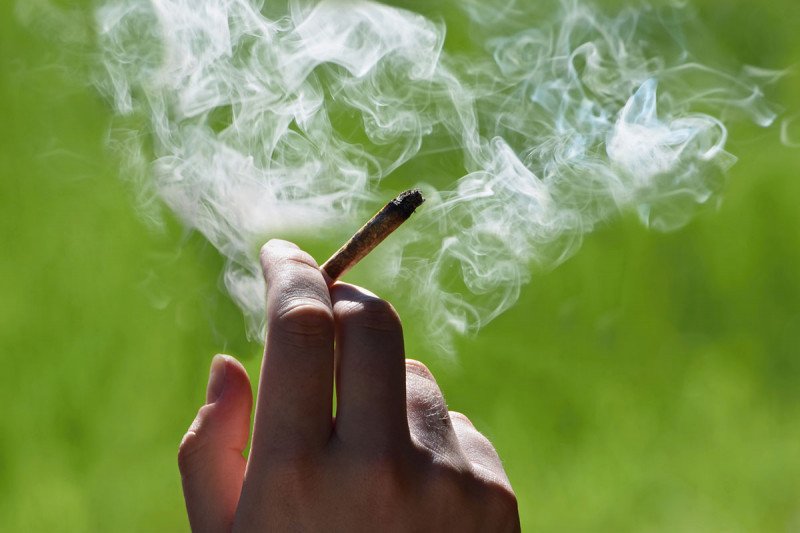
New York State is the latest to legalize the recreational use of marijuana for adults.
We asked Nirupa Raghunathan, an integrative medicine doctor at Memorial Sloan Kettering, and pharmacist Jason Hou, who manages MSK’s About Herbs database, to share what people with cancer should know before trying marijuana or its cousin, cannabidiol (CBD).
What does the new law mean for adults in New York?
Dr. Raghunathan: The new law allows New Yorkers 21 and over to have up to three ounces of marijuana for recreational use. Using and selling marijuana are both legal, except in schools, workplaces, or in cars. The law also allows New Yorkers up to 24 grams of concentrated cannabis products, including products containing CBD, which is one of many chemicals extracted from the cannabis plant. CBD is different from delta-9-tetrahydrocannabinol, also known as THC, which is another chemical extracted from the cannabis plant.
The law also establishes retail licenses, opening the door for dispensaries selling marijuana online and in retail stores.
Should people with cancer consider using marijuana for anxiety or to ease side effects from treatment?
Dr. Raghunathan: While legalization and regulation may change the accessibility and/or quality of all cannabis products, it doesn’t change the lack of scientific evidence. Unfortunately, we still don’t know enough about the benefits of these products for people with cancer. There is a lot of research happening in Canada and Australia because regulations around its use there have changed. It will be interesting to see what comes out of that. In the meantime, you and your doctor should discuss the potential benefits and harms of using anything with cannabis for medical purposes.
What about medical marijuana? How is it different from recreational marijuana and how can patients get it?
Dr. Raghunathan: Medical marijuana contains THC and that requires certification in states that allow for medical marijuana. In New York, people with cancer are allowed to use medical marijuana in the form of capsules, liquids, oils, powder, and patches for the skin. There is medical cannabis that can be vaped, but not medical-grade marijuana leaf that can be smoked. Medical marijuana providers must be registered with the New York State Department of Health’s Medical Marijuana Program. The restrictions in New York state are changing, but we don’t know how just yet.
Cannabis, also known as marijuana, is used to treat some symptoms related to cancer. It’s made from the flowers, leaves, and resin (sticky chemical) of the Cannabis sativa plant.
How can people with cancer use CBD?
Dr. Raghunathan: It is possible that CBD could have a benefit with symptoms of anxiety, poor sleep, and pain. CBD has been studied a lot in the laboratory and in mice but far less in humans. Right now there are some studies that are evaluating CBD as a part of cancer treatment, but none of those have had significant results. The studies that do show a benefit with CBD are for specific epilepsy syndromes in children.
What do we know about how CBD works?
Dr. Hou: When CBD is taken by mouth, some amount is absorbed and becomes available in the blood. There are cannabinoid receptors throughout the human body, and when CBD binds to them, that can trigger biological effects. But the downstream effects are still unclear because currently, there are very few human data. Other edible products containing CBD are likely absorbed and metabolized in a similar manner. There is, however, limited absorption through the skin with topical CBD oil.
Dr. Raghunathan: How CBD works is not fully understood, but it seems to work through a variety of pathways in the body that have different effects. For example, it seems to have an anti-inflammatory effect, which is helpful with pain. It also works on serotonin receptors, which helps with anxiety. Because CBD works in many ways, people should discuss it with a doctor. It is important to understand both the possible benefits and risks.
Dr. Hou: We need more research to assess the safety and effects of CBD. And we need to take a closer look at potential herb-drug interactions, which is especially important for people receiving chemotherapy.
Does CBD have psychoactive properties, like marijuana? Is it a sedative?
Dr. Raghunathan: CBD is not psychoactive in the same way that marijuana is. It doesn’t act on the cannabinoid receptors in the central nervous system, which is how THC works. However, it is possibly psychoactive because it works on serotonin receptors, and anything that affects mood is psychoactive. CBD has been studied in mice and seems to affect sleep-wake cycles. But CBD can be unexpectedly psychoactive and sedative because it’s not well-regulated. Studies have shown that some products that claim to be pure CBD actually have THC and other dangerous contaminants, such as opioids.
Dr. Hou: Since everyone responds to oral CBD differently, the side effects may range from mild sedation to cannabinoid hyperemesis syndrome. This is characterized by repeated and severe bouts of vomiting.
What do we know about CBD’s ability to fight or prevent cancer?
Dr. Hou: Currently, there is no clinical evidence for using CBD for cancer treatment or prevention. Some studies in cancer cell lines and in animal models found that CBD caused cancer cells to stop spreading and eventually die off. But those studies used highly concentrated and purified forms of CBD, which are not yet available to the general public. Clinical trials are needed to determine any potential anticancer effects of CBD.
Can people get CBD at MSK?
Dr. Raghunathan: If you make an appointment with MSK’s Integrative Medicine Service doctors, we can discuss CBD and whether it is appropriate for you. It does not require a prescription. We don’t recommend it for all patients because everyone is different. If we recommend CBD for you, we will discuss how to find a higher quality, more reliable product so you actually get what you’re paying for.






